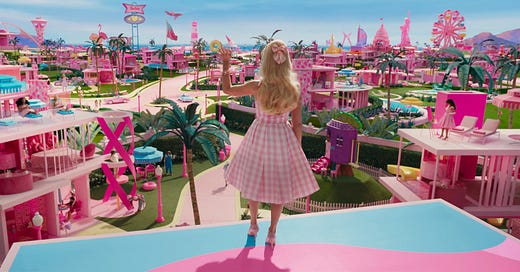Is "Barbie" a Critique of Consumerism or an Updated Version of It?
Greta Gerwig’s latest hit is a confluence of revolutionary and regressive aesthetics
For over a decade, Barbie had been tossed from studio to studio, from director to director, from star to star, until the iconic doll’s journey to the big screen was placed in the hands of beloved indie filmmaker Greta Gerwig. Since the announcement of the cast in early 2022, Barbie has been a highly anticipated filmmaking milestone, and the possibly accidental but nonetheless highly lucrative “Barbenheimer” confluence has served to solidify the film as one of the year’s biggest cinematic events.
When existentialism and imperfection is introduced into a matriarchal utopia of glossy pastel dolls and plasticine landscapes, Stereotypical Barbie (Margot Robbie) must cross the threshold from fantasy to reality in order to correct the rift in her life. She is joined by Ken (Ryan Gosling), an unwanted companion on the verge of tumbling into a life of inceldom if Barbie fails to feed him attention. However, Barbie is awakened to reality when she realizes Mattel’s slogans of “girl power” have not corrected any societal failings in the real world. She faces a variety of obstacles on a spectrum of severity: unabashed misogyny, crippling anxiety, cellulite, the goofy hijinks of bumbling corporate higher-ups, and the realization that she is the poster child for unrealistic standards for women.
Meanwhile, Ken, who has spent his life thirsting for attention from the woman he simply exists in relevance to, comes face to face with the joys of patriarchy in the real world. While reality crushes Barbie, it empowers Ken. After experiencing the real world, Ken still sees Barbie as an object, but not because her existence simply creates a role for him to enact. Now he finds that he needs an object to subjugate in order to distract from his insecurity about lack of identity.
Barbie displays an fascinating dichotomy, and is both comical and earnest in the process. Both Robbie and Gosling capture the look of their plastic counterparts, and they expertly portray the transformation from jocular naïveté into jaded existentialism or toxic masculinity. But that is the point where the intrigue stops. Barbie realizes that corporate messages of female empowerment do not prepare girls for the reality of subjugation, and this awareness could provide ample fodder for a great film, but Mattel’s financial grasp over Barbie undermines all of the film’s self-awareness.
While Greta Gerwig and Noah Baumbach’s screenplay pushes occasionally radical ideas, the compromization of this product becomes increasingly challenging to ignore. Because of Mattel’s critical control of the creative process, the insertion of subversive ideas serves to create a scheme of self-aware branding for the corporation. There might be a great movie in there somewhere, but every clever joke, every human moment, every example of genuine artistry is compromised by existing in the framework of a marketing scheme. Mattel can now advance their branding as self-aware, giving the illusion of ethics while still reaping the same profit -- capital is simply presenting an anti-capitalist version of itself.
Applicable social commentary from the movie begins to move in circles, vaguely gesturing at broad concepts of feminist theory which all result in a shrugging acceptance of the ordinary. There are lots of great quips, but much of its self-awareness seems to be anticipatory rebuttals to potential criticism, turning the film into a giant straw man defense mechanism. But as Barbie questions every facet of her false reality, there is only one essential, unquestioned factor in the equation: consumption.
Barbie claims that consumption and capital will always exist; our job as consumers is to mitigate the worst of it. The movie claims that insecurity is the source of abuse of power, not the inherent destructiveness of power itself — it’s the Kens lack of identity that leads them to destroy Barbieland. Mattel emphasizes that women don’t need to feel extraordinary to see themselves represented by the company’s products — just getting through the day is admirable enough, as long as they continue to consume. A critique of consumer culture becomes consumption itself, and the public service messaging of mental health awareness and feminism is beholden to the marketability of it. No matter how many subversive ideas are present in the film, Barbie’s self-awareness simply creates a new method for the company to market itself.
OVERALL SCORE: 6/10
Barbie was released on July 21, 2023 and is currently in US theaters.





Or is it just a psychedelic layer of distraction, smeared on top of the millions of other layers of spectacle & entertaining programming & gaming keeping the masses from realizing their house is on fire? Religion used to be the opium, but now it's bizarre, extreme, regurgitated pop culture icons, up to & including a sleaze-bag celebrity mob boss attempting to destroy the actual society from the top down.
Dad, F-Troop is still fuzzy . . .